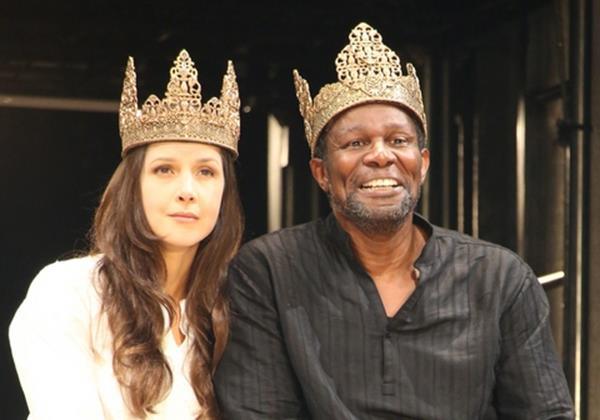
Blood, fittingly, gets on everything in Theatre for a New Audience's Tamburlaine, Parts I and II. For the stylized violence in this adaptation of two of Christopher Marlowe's Elizabethan box-office hits, that sometimes means literal buckets of vital fluid; other times, the hem of a white garment trails through a pool of it, or a hand leaves a partial print on a lover’s face. Ably condensed into two 90-minute plays with a half-hour intermission (the minimum amount of time needed to sufficiently de-gore the stage), Tamburlaine's epic military conquests raise him from shepherd to emperor on a bare stage adorned only with hanging plastic strips at the rear that render the world of the play as a meat locker or Patrick Bateman's living room.
Tamburlaine (John Douglas Thompson) possesses the vaulting ambition of Marlowe's Doctor Faustus, but he is much more successful. While Faustus wastes the Satanic pact for his soul on petty pranks, the Scythian shepherd makes substantial, merciless progress towards his goal of subjugating the known world. The play’s globetrotting, exoticizing language evokes the extent and richness of that world, invoking locations (and their treasures) from the far East to the Americas. Conquest such as this, Tamburlaine reminds us, requires ceaseless bloodshed. Making a thematic virtue of the episodic nature of the text, actors play two, three, and more roles during the production. They die to arise and be killed again, their reincarnations highlighting both the self-perpetuation of military violence and the endless revolutions of Fortune's wheel, a popular Renaissance trope. Kings are reborn as as jailers who then become kings again, only to be conquered yet again. It is perhaps not comforting that Tamburlaine’s battlefield strength is powerless against time, sickness, and mortality, since there is no hint that his death will mean the end of this endless state of war. Quite the opposite: he bequeaths both his crown and his project of conquest to his son Amyras, whom Zachary Infante imbues with the suggestion that he will be a figure akin to Games of Thrones' King Joffrey.
Strikingly, in a play about war, love is as powerful a drive as victory. Tamburlaine is motivated to conquer Egypt to honor a wife -- Zenocrate (Merritt Janson), an Egyptian princess whom he takes captive but who grows to adore him -- as well as win a region, and his affection for her hubristically outlasts her death: he carries her body with him when he continues his conquests through Part II. Women are given powerful emotions as well; Olympia (Nilanjana Bose), the wife of a man killed in battle (Oberon K.A. Adjepong), kills her son (Ian Saint-Germain) and attempts to kill herself to keep their family together, but is thwarted when Theridamas (Andrew Hovelson), one of Tamburlaine’s generals, vows to win her. His failure to win her heart or her body inverts Tamburlaine’s earlier success in similar circumstances, as she tricks him into killing her so that she can be with her family again. The most notable display of affection among the secondary characters, however, is that between Bajazeth and Zabina, mirrors to Tamburlaine and Zenocrate as the power couple who loses the battle. Imprisoned and humiliated, their suicides are framed by a death scene whose pathos is underscored by Zabina's affecting lamentation.
This Tamburlaine is adept at producing memorable images, whether Tamburlaine expounding on beauty in front of a wall awash in rivulets of blood; Olympia murdering her son and rolling his body into a pit to burn; or Tamburlaine atop a chariot stuffed with golden crowns and drawn by deposed kings, all of which slows unexpectedly while he delivers yet another of his lofty orations. The cast is uniformly impressive, as is usual for TFANA. John Douglas Thompson manages to humanize this outsize boaster and self-declared god in scenes with his wife and friends, and TFANA veteran Saxon Palmer is excellent in multiple pivotal roles.
This staging uses TFANA's still-new space creatively and involves the audience in various ways, speaking directly to them and in some cases making them complicit with the ambition and violence onstage. The lighting is skillfully employed to frame events on stage, ranging from a golden glow that imparts a sense of richness to match the imagery of the language of conquest to harsh fluorescents over-illuminating a corpse in white. Despite its length, this performance is never boring, modulating smoothly between violence and romance, comedy and tragedy, bluster and quiet moments. Percussionist Arthur Solari, performing from a balcony just visible high above the main stage, deserves special mention as a major contributor to the play’s rhythm and momentum.
Fortune's wheel has just extended Tamburlaine’s run, so catch this seldom-revived pairing before January 4, 2015. - Leah Richards and John Ziegler
